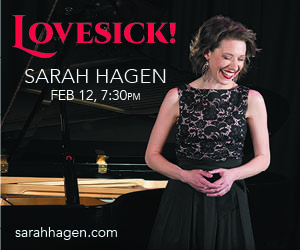The highlights of June are the world premieres of two ambitious Canadian operas: the first a huge production by one of the grand masters of Canadian music, the second by a recent University of Toronto graduate. As the latest expressions of Canadian contemporary opera, both demand to be seen.

Tim Albery, director: “Murray’s written a dream story - the journey of a child that he calls the holy child, who meets a strange dark man, in the night in the middle of a storm, who gives him a letter for the king of France asking permission to travel. ... Like many dreams it takes strange byways and highways. There are temptations, characters who appear out of nowhere. And the audience follows the child through the multiple rooms of this old 1930s warehouse never knowing quite what’s coming next in the same way as the crusading children never knows what’s coming next. They are all poor, all desperate, on a ridiculous journey to conquer Jerusalem with love, not weapons. ... From a production point of view, the logistics are just as scary: How on earth do we get from place to place?”
The first to arrive in June is The Children’s Crusade by R. Murray Schafer, still a force to be reckoned with at age 75. The opera co-commissioned by Soundstreams and Luminato will be presented June 5-11 in a warehouse at 153 Dufferin St. Schafer is renowned for his 12-part environmental operatic cycle, Patria, performed in unconventional indoor and outdoor locations, most notably in the Haliburton Forest and Wildlife Reserve. For the 90-minute Crusade, the audience will move through the warehouse space along with the cast and musicians, our journey paralleling theirs.

According to conductor David Fallis, Schafer focuses on the conflict between innocence and idealism of the children versus the cynicism of the adults. Lawrence Cherney, Soundstreams’ Artistic Director, calls The Children’s Crusade Schafer’s “most compelling work yet,” since it “explores the innocence and passion of children convinced they could create a world of peace.”
 The work is written for 16 musicians playing a combination of modern, medieval and Middle Eastern instruments. It will feature over 100 performers, including the Toronto Consort, the Canadian Children’s Opera Company, an adult chorus and dancers. Boy soprano Jacob Abrahamse sings the Holy Child and Maryem Toller (right) sings Ariana, a Muslim woman who appears to the Child in visions. Actor Diego Matamoros plays four non-singing roles. Director Tim Albery, familiar with large-scale projects, having directed Wagner’s Götterdämmerung and Prokofiev’s War and Peace for the COC, stresses that Crusade is a modern work, not a medieval pageant, and will be presented in modern dress.
The work is written for 16 musicians playing a combination of modern, medieval and Middle Eastern instruments. It will feature over 100 performers, including the Toronto Consort, the Canadian Children’s Opera Company, an adult chorus and dancers. Boy soprano Jacob Abrahamse sings the Holy Child and Maryem Toller (right) sings Ariana, a Muslim woman who appears to the Child in visions. Actor Diego Matamoros plays four non-singing roles. Director Tim Albery, familiar with large-scale projects, having directed Wagner’s Götterdämmerung and Prokofiev’s War and Peace for the COC, stresses that Crusade is a modern work, not a medieval pageant, and will be presented in modern dress.
For more information about Soundstreams and video interviews with Schafer, visit our soundstreams profile page. For tickets and further information about Luminato, visit www.luminato.com.
Mark Richards’ Hamlet
Equally ambitious is 31-year-old Mark Richards’ passion to write an opera based on Shakespeare’s Hamlet. Richards, who received his Master’s degree in music theory from the University of Toronto in 2007, has been writing the music and libretto for this full-length opera since 2004. It was given its first complete public reading at Stratford Summer Music in 2008 where it was acclaimed by enthusiastic audiences.
TrypTych gives the piece its first complete staging on June 26 and 27 at Trinity Presbyterian Church, 2737 Bayview Avenue, with Brett Kingsbury conducting and Edward Franko directing.
Richards says that writing vocal music has always come naturally to him: “When I finished my bachelor’s, I decided I needed a large, long-term project to help solidify my musical style and help find my own compositional voice.” He chose Hamlet because he has always been passionate about the play and found that the emotions it inspired helped him to write the music. Richards’ goal was fidelity to Shakespeare’s text, although operatic form obviously necessitated abridging the play and reducing the number of characters.
Hamlet is written for seven singers with some doubling of roles, and comprises over 50 recitatives, arias, duets and ensembles. In Stratford it had an eight-member chamber orchestra. In Toronto it will have piano accompaniment – but, unlike Stratford, the singers will be off-book and in character with Paul Williamson as Hamlet, Virginia Gallop-Evoy as Gertrude and Nathaniel Wiseman as Claudius. TrypTych has already expressed its desire to bring the opera to a fully-staged and costumed production with orchestra in the near future. For more information about the composer, including excepts from Hamlet, visit www.markrichardscomposer.com. For more about TrypTych click here.



